|
Earlier in the season Sound Advice celebrated the girls of summer. As the
season's days dwindle down to a precious few, it's time to examine some recent
offerings by their male singing or songwriting counterparts.
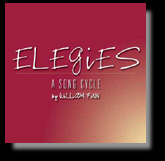 The American Heritage Dictionary defines 'elegy' as either a poem or
song composed especially as a lament for a deceased person or, when used
as a musical term, a composition that is melancholic or pensive in tone.
Neither definition adequately defines Elegies: A Song Cycle by William
Finn
, a recording based on the recent revue of Finn's work that ran at
Lincoln Center earlier this year. While all the songs are about loss due
to actual or perceived death, the words 'lament' and 'melancholy' do not
describe Finn's take on the subject, which usually involves a great deal
of wry humor that is more celebratory than funereal. The American Heritage Dictionary defines 'elegy' as either a poem or
song composed especially as a lament for a deceased person or, when used
as a musical term, a composition that is melancholic or pensive in tone.
Neither definition adequately defines Elegies: A Song Cycle by William
Finn
, a recording based on the recent revue of Finn's work that ran at
Lincoln Center earlier this year. While all the songs are about loss due
to actual or perceived death, the words 'lament' and 'melancholy' do not
describe Finn's take on the subject, which usually involves a great deal
of wry humor that is more celebratory than funereal.
Many of the songs on Elegies are classic Finn narrative numbers which
contain somewhat meandering melodies and sharp internal rhyme schemes.
Thankfully, all five performers in Elegies are great storytellers and are
more than up to making the songs reach their full potential. "Mark's
All-Male Thanksgiving" creates a pseudo-throughline for Michael Rupert
(if not for the show in general) as characters introduced in the song
appear in other numbers: "Monica and Mark" and "Venice" (all of which deal
with losses due to AIDS and are stylistically very similar to Finn's
Marvin songs). "Only One," a devastatingly powerful number
illustrating the passionate final statement of a hardened English teacher,
displays Betty Buckley at her storytelling best and showing more restraint than
she has in years. She is equally effective on "14 Dwight Ave., Natick,
Massachusetts" (where she is joined by Christian Borle), a memory piece
sung by a mother on her last drive around the neighborhood. She also gets
the most tenderly beautiful piece on the CD, "Looking Up," which nearly
was the title of the show.
The most effective songs on the album are perhaps those that treat loss
with a touch of comedy or, at the very least, lighthearted tongue-in-cheek. Carolee Carmello gives a hysterical tour-de-force performance in
"Passover," a number recounting a family gathering. Michael Rupert is
delightful on "The Ballad of Jack Eric Williams (and Other 3-Named
Composers)," which is presented as a letter between William Finn and Ricky
Ian Gordon about another three-named songwriter, Jack Eric Williams, (best
known as the original Beadle in Sweeney Todd). Christian Borle shines on "My
Dogs," a number recounting the various canines in his life. Keith Byron
Kirk testifies mightily on the strengths of "Joe Papp" and is nostalgic
over the loss of a corner store and its proprietors, "Mister Choi and
Madame G."
Elegies is the strongest revue album to be released since, well,
Finn's last revue, Infinite Joy, and both serve to illustrate why
Finn is one of our greatest living storytellers.
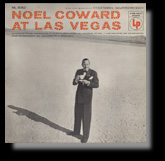
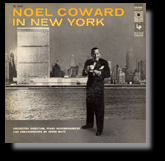 |
In 1955, one of England's greatest songwriters took America by storm.
Noel Coward, the epitome of urbane wit and sophistication (despite the fact
that he was the son of an unsuccessful piano salesman and only had a few
years of elementary school education), was talked into performing in Las
Vegas by Joe Glaser, the legendary impresario best known as Louis
Armstrong's manager. Thanks in no small part to arrangements by his new
music director, Peter Matz (Coward's usual musical director, Norman
Hackforth, being denied a work visa), Coward became the toast of Las
Vegas and, later on, New York.
DRG Records has recently released two albums celebrating Coward's
triumphant return to the States: Noel Coward at Las Vegas (recorded
live at the Desert Inn in 1955) and Noel Coward in New York (a
studio recording from 1956). Coward has always been a bit of an odd mix of
the past and 'present,' with his Gilbert and Sullivan stylings fused with
topics and innuendoes never appearing in Victorian sensibilities, but
Matz's arrangements brought him firmly into the New World and showcased
Coward at his vocal and interpretive best. The Vegas album is the more
comic of the two, containing such gems as "Uncle Harry" (a patter song
about an English missionary enjoying the natives a tad overly much) and
the classic ode to anti-imperialism, "Mad Dogs and Englishmen." He also
has fun with a parody of Cole Porter's "Let's Do It," making it even more
risqué than the original. The Vegas album contains a few of his beautiful
ballads ("World Weary," "Matelot," "The Party's Over Now, "and "A Room
with a View"), but the tone is a touch more comic than the New York album.
Noel Coward in New York repeats only one number, a snippet of
"The Party's Over Now," (Coward's signature 'farewell' song), and is a
much more 'swinging' album, as evidenced by "I Like America," "Louisa,"
"Time and Again," and "20th Century Blues." Naturally, classic Coward
patter numbers are included: "I Went to a Marvelous Party" (Coward's
revenge to being invited to a party, only to find he was expected to
perform the entire time), "Why Must the Show Go On" (a hysterical
indictment to the acting industry), and "I Wonder What Happened to Him"
(another of his anti-imperialism patter numbers, this time set in India).
The album also contains one of his more touching and beautiful ballads,
"Sail Away." While it would have been wonderful to have both albums put on one
CD, as they did with a cassette version a while back, their combined
length makes it impossible without cutting a song or two, an impossible
feat as every number is a gem.
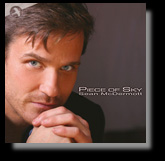 Sean McDermott, seen on Broadway in Miss Saigon (Chris),
Falsettos (Whizzer), Starlight Express (Rusty), and
Grease (Danny Zuko), has released his third solo album, Piece of
Sky
. McDermott is blessed with a beautiful and versatile vocal instrument,
and he is as adept at handling light, almost falsetto numbers like "You Walk
With Me" from The Full Monty as he is with driving, powerhouse
songs like "Gethsemane" from Jesus Christ Superstar. The album is
well sung and beautifully orchestrated for a full orchestra, but one
wishes it were more adventurous. While the lesser done numbers are
enjoyable, such as "Where Do I Go?" from
Hair, the title number, and "I'd Rather Be Sailing" from A New
Brain, far too many songs come from that list of 'do they really need
to be recorded again' numbers: "Music of the Night," "Bring Him Home,"
"Sun and Moon," "Soliloquy" (a number that, in this reviewer's oh-so
humble opinion, never works outside of Carousel and should be
banned from all piano bars, cabarets and albums), the aforementioned
"Gethsemane" and "New York, New York," with "Elaborate Lives" rapidly
joining their ranks. Still, this is the perfect album for those who enjoy
a powerhouse singer and haven't had their fill of the selections. Sean McDermott, seen on Broadway in Miss Saigon (Chris),
Falsettos (Whizzer), Starlight Express (Rusty), and
Grease (Danny Zuko), has released his third solo album, Piece of
Sky
. McDermott is blessed with a beautiful and versatile vocal instrument,
and he is as adept at handling light, almost falsetto numbers like "You Walk
With Me" from The Full Monty as he is with driving, powerhouse
songs like "Gethsemane" from Jesus Christ Superstar. The album is
well sung and beautifully orchestrated for a full orchestra, but one
wishes it were more adventurous. While the lesser done numbers are
enjoyable, such as "Where Do I Go?" from
Hair, the title number, and "I'd Rather Be Sailing" from A New
Brain, far too many songs come from that list of 'do they really need
to be recorded again' numbers: "Music of the Night," "Bring Him Home,"
"Sun and Moon," "Soliloquy" (a number that, in this reviewer's oh-so
humble opinion, never works outside of Carousel and should be
banned from all piano bars, cabarets and albums), the aforementioned
"Gethsemane" and "New York, New York," with "Elaborate Lives" rapidly
joining their ranks. Still, this is the perfect album for those who enjoy
a powerhouse singer and haven't had their fill of the selections.
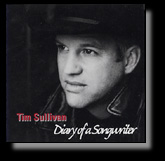 While a great deal of cyber-ink has been spilled on the various
Sullivan Family Singers, it has been focused (on this site at least) on
the women of the Boggy Depot clan: Heather, K.T. and Stacy. However, the
men in the family are just as talented and
possess equally distinctive styles and vocal types. Tim Sullivan is the member of
the brood that is more than a little bit country, having performed
on stage with artists like Vince Gill, Alan Jackson, Willie Nelson, Glen
Campbell and Tammy Wynette. He has recently released a CD that is a
combination solo/cast album entitled Diary of a Songwriter, based
on a one person show Tim has been performing around the country. The album
and show, written by Tim and his collaborators Dan and Michele Page, is a
quasi-autobiographical account of being a songwriter trying to make music
and carve out a successful career. The songs are by turns touching
("Wedding Day," "Dance in the Rain" and "Love Before First Sight"), joyful
("Road to Paradise") and hysterically funny ("Ain't Like the Songs on the
Radio;" "My Best Friends," a patter number containing the names of a
hundred singers who have influenced him; and "Goodbye Doesn't Get Any
Better Than This," a number that started a feeding frenzy in New York when
he performed the show earlier this year and needs to be picked up by a
major country singer). The album is country at its finest, containing
strong lyrics and catchy melodies sung by an engaging performer with warm
vocals and easy charm. For more information, visit
www.diaryofasongwriter.com. While a great deal of cyber-ink has been spilled on the various
Sullivan Family Singers, it has been focused (on this site at least) on
the women of the Boggy Depot clan: Heather, K.T. and Stacy. However, the
men in the family are just as talented and
possess equally distinctive styles and vocal types. Tim Sullivan is the member of
the brood that is more than a little bit country, having performed
on stage with artists like Vince Gill, Alan Jackson, Willie Nelson, Glen
Campbell and Tammy Wynette. He has recently released a CD that is a
combination solo/cast album entitled Diary of a Songwriter, based
on a one person show Tim has been performing around the country. The album
and show, written by Tim and his collaborators Dan and Michele Page, is a
quasi-autobiographical account of being a songwriter trying to make music
and carve out a successful career. The songs are by turns touching
("Wedding Day," "Dance in the Rain" and "Love Before First Sight"), joyful
("Road to Paradise") and hysterically funny ("Ain't Like the Songs on the
Radio;" "My Best Friends," a patter number containing the names of a
hundred singers who have influenced him; and "Goodbye Doesn't Get Any
Better Than This," a number that started a feeding frenzy in New York when
he performed the show earlier this year and needs to be picked up by a
major country singer). The album is country at its finest, containing
strong lyrics and catchy melodies sung by an engaging performer with warm
vocals and easy charm. For more information, visit
www.diaryofasongwriter.com.
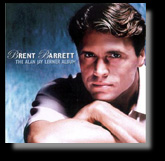 Having scored big with an album devoted to Kander and Ebb, Brent
Barrett moved on to another legendary theater composer with his latest
album, Brent Barrett: The Alan Jay Lerner Album. Thankfully,
while Lerner penned the lyrics for such hit shows as My Fair Lady,
Brigadoon and Camelot, for the most part the album eschews the
familiar, focusing instead on the lesser known numbers in the Lerner
cannon. To make things even more interesting, Barrett, thanks to
arrangements by Christopher Denny and Barry Kleinbort and orchestrations
by Lenny Meyers, gives the songs a more subdued, less theatrical feel,
making them all the more intimate. Having scored big with an album devoted to Kander and Ebb, Brent
Barrett moved on to another legendary theater composer with his latest
album, Brent Barrett: The Alan Jay Lerner Album. Thankfully,
while Lerner penned the lyrics for such hit shows as My Fair Lady,
Brigadoon and Camelot, for the most part the album eschews the
familiar, focusing instead on the lesser known numbers in the Lerner
cannon. To make things even more interesting, Barrett, thanks to
arrangements by Christopher Denny and Barry Kleinbort and orchestrations
by Lenny Meyers, gives the songs a more subdued, less theatrical feel,
making them all the more intimate.
With a rich baritone that is capable
of caressing every word and note (especially on the tender gem of a find,
"Tell Me, Tell Me," from Lolita, My Love), as well as ringing the
notes to the rafters ("They Call the Wind Maria" from Paint Your
Wagon), Barrett makes every song his own and proves why he is one of
the best baritones on Broadway today. Other highlights on the album
include a duet with Lauren Bacall (the tender "You Haven't Changed at
All," from the nearly forgotten The Day Before Spring paired
beautifully with "I Remember It Well" from Gigi), two songs from
Dance a Little Closer (a music-box version of "Anyone Who Loves"
and "There's Always One You Can't Forget," one of the best songs written
by either Charles Strouse or Lerner) and two from one of his
collaborations with Burton Lane, Royal Wedding ("Too Late Now" with
Tami Tappan and "I Left My Heart in Haiti," a novelty samba number that
makes for a delightful upbeat moment on an album largely devoted to
ballads).
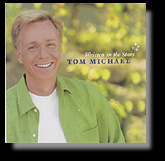 Chicago based singer Tom Michael has released a beautiful CD,
Written in the Stars that takes the adage 'less is more' to
perfectly well realized heart. From its start, with a tender take on "It
Might Be You" (Alan & Marilyn Bergman, Dave Grusin) to its finale, a
spare, delicate gem of a song called "It's Time" (Susan Dilallo, Jeffrey
D. Harris), the album is a rarity: a project in which the entire creative
team had the good sense to never push or use tricks to get a song across
when simplicity would do. While the majority of the songs are familiar,
in Michael's capable hands they seem like old friends one wants to revisit
rather than relatives who have overstayed their welcome. Highlights include
a well-realized version of Bricusse/Mancini's "Two For The Road," with its
simple pairing of guitar and piano, and "Home to Myself" (Carole Bayer
Sager and Melissa Manchester), another piano/guitar number that simply
floats to heaven on Michael's delicate voice and phrasing. Chicago based singer Tom Michael has released a beautiful CD,
Written in the Stars that takes the adage 'less is more' to
perfectly well realized heart. From its start, with a tender take on "It
Might Be You" (Alan & Marilyn Bergman, Dave Grusin) to its finale, a
spare, delicate gem of a song called "It's Time" (Susan Dilallo, Jeffrey
D. Harris), the album is a rarity: a project in which the entire creative
team had the good sense to never push or use tricks to get a song across
when simplicity would do. While the majority of the songs are familiar,
in Michael's capable hands they seem like old friends one wants to revisit
rather than relatives who have overstayed their welcome. Highlights include
a well-realized version of Bricusse/Mancini's "Two For The Road," with its
simple pairing of guitar and piano, and "Home to Myself" (Carole Bayer
Sager and Melissa Manchester), another piano/guitar number that simply
floats to heaven on Michael's delicate voice and phrasing.
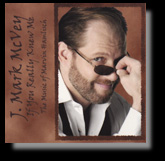 In a highly refreshing move, J. Mark McVey, recently seen on Broadway
as Jean Valjean in Les Miserables, has released an album devoted to
the music of Marvin Hamlisch, If You Really Knew Me: The Music of Marvin Hamlisch. McVey, who has performed with Hamlisch in
concerts across the country, does a wonderful job of giving many of
Hamlisch's songs a breezy jazz feel, especially "One" and "What I Did for
Love" from A Chorus Line, into which he breathes considerable new
life. Other standouts are a jazzy R&B take on "Nobody Does it Better" from
The Spy Who Loved Me and "The Last Time I Felt Like This." The only
failing on the album is that the jazz and R&B numbers are so much fun and
make such a perfect backdrop for a romantic evening that when the style
becomes more legitimate (or at least more closely mirroring the original
version), the mood gets bent, if not broken. While he does a beautiful job
with "Theme from Ice Castles" and "The Way We Were," the styles just don't
gel with the rest of the album, or at least the album I was falling in
love with. As a bonus track, the CD contains a hauntingly simple version
of "I Cannot Hear the City" (Sweet Smell of Success). For more information on J. Mark McVey visit
www.jmarkmcvey.com [Note: the website, unfortunately, has not been updated to include the new CD.] In a highly refreshing move, J. Mark McVey, recently seen on Broadway
as Jean Valjean in Les Miserables, has released an album devoted to
the music of Marvin Hamlisch, If You Really Knew Me: The Music of Marvin Hamlisch. McVey, who has performed with Hamlisch in
concerts across the country, does a wonderful job of giving many of
Hamlisch's songs a breezy jazz feel, especially "One" and "What I Did for
Love" from A Chorus Line, into which he breathes considerable new
life. Other standouts are a jazzy R&B take on "Nobody Does it Better" from
The Spy Who Loved Me and "The Last Time I Felt Like This." The only
failing on the album is that the jazz and R&B numbers are so much fun and
make such a perfect backdrop for a romantic evening that when the style
becomes more legitimate (or at least more closely mirroring the original
version), the mood gets bent, if not broken. While he does a beautiful job
with "Theme from Ice Castles" and "The Way We Were," the styles just don't
gel with the rest of the album, or at least the album I was falling in
love with. As a bonus track, the CD contains a hauntingly simple version
of "I Cannot Hear the City" (Sweet Smell of Success). For more information on J. Mark McVey visit
www.jmarkmcvey.com [Note: the website, unfortunately, has not been updated to include the new CD.]
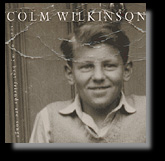 The original Jean Valjean, Colm Wilkinson, has released an album about
as far removed from Les Miserables as one can get. Returning to his
pop roots, Wilkinson has recorded a collection of songs appropriately
entitled Some of My Best Friends are Songs, his first CD release
after a thirteen year absence from the recording world. The album
contains a variety of pop songs, including "A Song for You," (Leon
Russell), "Suzanne" (Leonard Cohen), and "M.L.K/I Still Haven't Found What
I'm Looking For" (U2). The album also contains two numbers written by
Colm, "We Are One" and "If I Knew Then," and one by another relative,
Aaron Wilkinson, the best and most heartbreaking number on the album,
"Last to Know." The album is decidedly in the pop/rock vein, which works
well with Wilkinson's voice, and his attention to lyrics makes this a
highly listenable and enjoyable album. For more information or to order
visit www.colmwilkinson.com/shop4.html. The original Jean Valjean, Colm Wilkinson, has released an album about
as far removed from Les Miserables as one can get. Returning to his
pop roots, Wilkinson has recorded a collection of songs appropriately
entitled Some of My Best Friends are Songs, his first CD release
after a thirteen year absence from the recording world. The album
contains a variety of pop songs, including "A Song for You," (Leon
Russell), "Suzanne" (Leonard Cohen), and "M.L.K/I Still Haven't Found What
I'm Looking For" (U2). The album also contains two numbers written by
Colm, "We Are One" and "If I Knew Then," and one by another relative,
Aaron Wilkinson, the best and most heartbreaking number on the album,
"Last to Know." The album is decidedly in the pop/rock vein, which works
well with Wilkinson's voice, and his attention to lyrics makes this a
highly listenable and enjoyable album. For more information or to order
visit www.colmwilkinson.com/shop4.html.
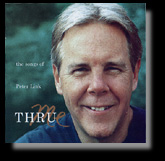 Songwriter Peter Link, known to musical theatre aficionados as the man
responsible for the music of the less-than-successful Broadway musical
King of Hearts, has released a two-disc solo album devoted to his
songs entitled Thru Me. Link came to my attention at a recent
MAC/ASCAP songwriters showcase where he performed one of the most powerful
songs of the evening, a tender gem entitled "Without You." Thankfully,
that number appears on this set, which is a
treasure trove of material for people looking for songs with a decidedly
pop/folk bent. His songs are for the most part wonderfully mellow, and
highlights on the discs include a beautiful ballad, "It's You Again," and
a song from King of Hearts, "With My Friends." Thru Me can be ordered by contacting Peter Link Studios, 484 West 43rd Street, New York, NY 10036, 212 244-0426. Songwriter Peter Link, known to musical theatre aficionados as the man
responsible for the music of the less-than-successful Broadway musical
King of Hearts, has released a two-disc solo album devoted to his
songs entitled Thru Me. Link came to my attention at a recent
MAC/ASCAP songwriters showcase where he performed one of the most powerful
songs of the evening, a tender gem entitled "Without You." Thankfully,
that number appears on this set, which is a
treasure trove of material for people looking for songs with a decidedly
pop/folk bent. His songs are for the most part wonderfully mellow, and
highlights on the discs include a beautiful ballad, "It's You Again," and
a song from King of Hearts, "With My Friends." Thru Me can be ordered by contacting Peter Link Studios, 484 West 43rd Street, New York, NY 10036, 212 244-0426.
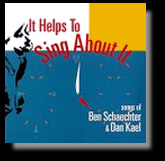 For people looking for songs with a more comic tone, the songs of Ben
Schaechter and Dan Kael, collected on a CD entitled It Helps to Sing
About It, are definitely worth looking into. Although the album
contains some beautiful ballads (chief of which being the heartrending "I
Can Tell Time," a gorgeous minimalist number told from the point of view
of a five year old dealing with his parents' divorce and perfectly
interpreted by Tom Keeling), the comic numbers are the true standouts on
the album. Most of the numbers deal with the comic 'joys' of urban living,
such as "My Apartment" (sung by Michele Pawk), which details the saga of
cleaning one's apartment in anticipation of date that never occurs, or
"It's Beyond Me" (also sung by Pawk), which tells of a Jewish mother
dealing with the fact that her son is gay and dating a person whom she
diapered long ago. Many of the songs were written for various Off Broadway
revues, such as That's Life (a show that explores the Jewish
identity in modern America and was nominated for an Outer Critic's Circle
Award), Pets! and The Sunday Times, which produced "He Knew
How to Read Me," one of the few torch songs ever told from the point of
view of a newspaper (Pawk again). To order,
visit Footlight Records For people looking for songs with a more comic tone, the songs of Ben
Schaechter and Dan Kael, collected on a CD entitled It Helps to Sing
About It, are definitely worth looking into. Although the album
contains some beautiful ballads (chief of which being the heartrending "I
Can Tell Time," a gorgeous minimalist number told from the point of view
of a five year old dealing with his parents' divorce and perfectly
interpreted by Tom Keeling), the comic numbers are the true standouts on
the album. Most of the numbers deal with the comic 'joys' of urban living,
such as "My Apartment" (sung by Michele Pawk), which details the saga of
cleaning one's apartment in anticipation of date that never occurs, or
"It's Beyond Me" (also sung by Pawk), which tells of a Jewish mother
dealing with the fact that her son is gay and dating a person whom she
diapered long ago. Many of the songs were written for various Off Broadway
revues, such as That's Life (a show that explores the Jewish
identity in modern America and was nominated for an Outer Critic's Circle
Award), Pets! and The Sunday Times, which produced "He Knew
How to Read Me," one of the few torch songs ever told from the point of
view of a newspaper (Pawk again). To order,
visit Footlight Records
-- Jonathan Frank
Make sure you check our list of Upcoming Releases.
|
|

